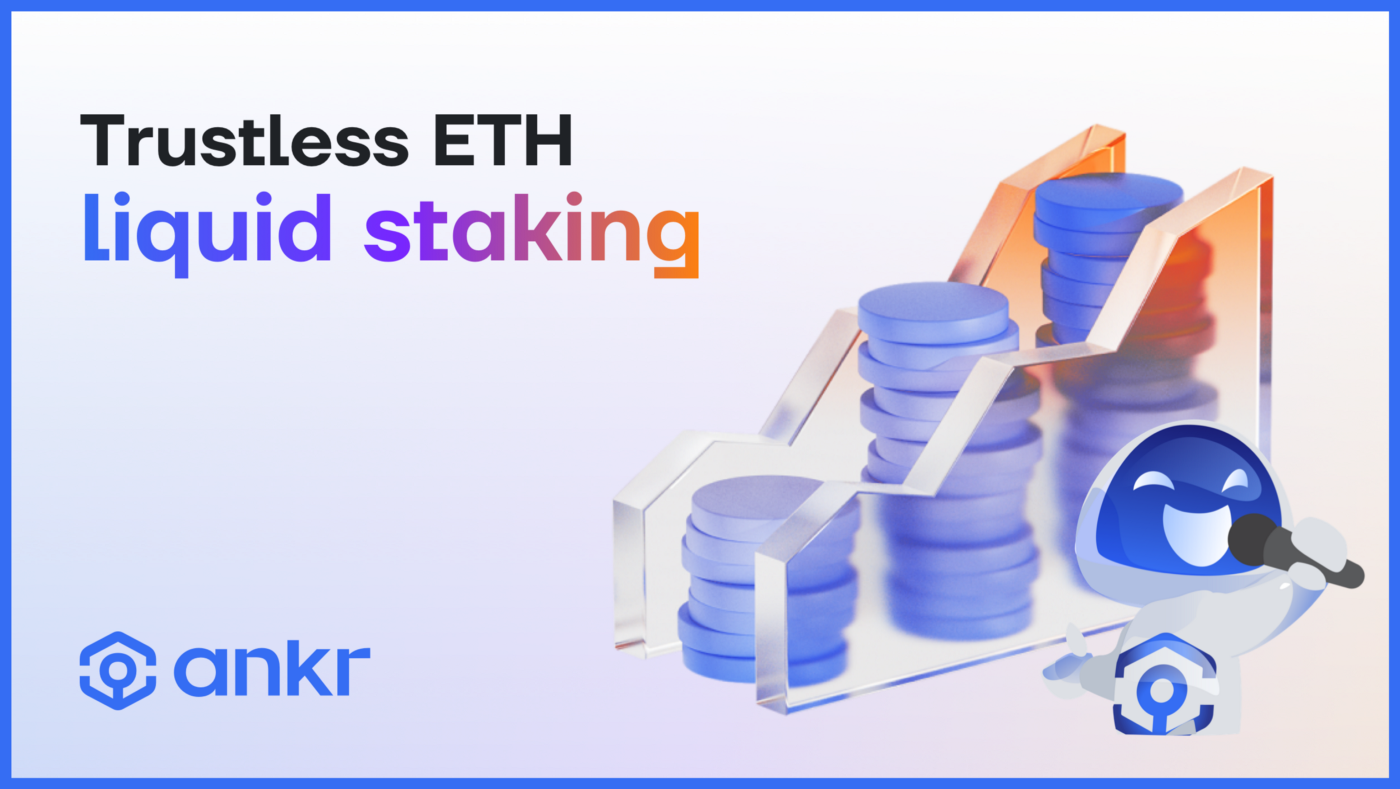Trustless Liquid Staking: Removing Intermediary Risk With SSV Technology

Ethan Nelson
October 28, 2022
7 min read

If you're new to DeFi, the multiple components of liquid staking might be overwhelming. As a general rule, the more openness and lack of trust, the better. As a result, Ankr is collaborating with SSV.network, an Ethereum Foundation project, to include Distributed Validator Technology into the Ankr Liquid Staking protocol. In this post, we'll go through what this implies for you as an Ankr user, our product future, and the consequences of this new technology for the Ethereum ecosystem.
This article expands on our earlier piece, Ankr-SSV Partnership: A Step Closer to Trustless ETH Liquid Staking, in which we introduced SSV technology and discussed how it works and connects to staking.
What Does It Mean to Be Completely Trustless?
Trustless systems have the ability to reshape economic relationships by letting consumers establish trust in abstract notions rather than institutions or other third parties," Binance said in a recent post. This allows us to see where the trust is put.
At the end of the day, there is no such thing as a completely trustworthy system. Faith exists in some form or another; the issue is, where do you place your trust, and how do you assess it?
If you participate significantly in the TradFi procedures, you will see that your confidence is fully in the hands of the centralized organization/bank. As a result, if that business fails, your assets will collapse as well, resulting in substantial counterparty risk at the end of the day.
Assume you're involved in blockchains and the DeFi space. In that situation, you trust the source code and consensus procedures of any blockchains in which you invest – Bitcoin, Ethereum, Polygon, Avalanche, and so on.
With that stated, we'll argue that Secret Shared Validator Technology is the least hazardous alternative for delegating staked assets. This is why.
Ankr and SSV Join Forces
Ankr is pleased to announce that we are collaborating with SSV.network to offer a new liquid staking solution that is completely trustless and non-custodial.
We are dedicated to creating the most secure and dependable liquid staking technology available. SSV technology is the next step in our plan to become completely trustless, permissionless, transparent, and decentralized.
Furthermore, if implemented successfully, this update will assist Ankr in adapting to the shifting staking ecology that Ethereum is implementing as part of The Merge and the Shanghai upgrade.
A Protocol for Trustless Liquid Staking Asset Delegation
We do not intend to immediately switch over all of our liquid staking products. Instead, we will divide our liquid staking services into two products: SSV Liquid Staking and the original liquid staking.
Let's start with why trustless staking architecture is such a big deal in the first place.
The key benefit of blockchain, as we all know, is its trustlessness. Similarly, entrusting your blockchain-based assets to an intermediary contradicts the point of blockchain. Fast forward to the present, and the marketplace's ecosystem of liquid staking possibilities all demand trust and authorization at some point. You must trust that they will choose reliable validators and maintain the value of your derivative tokens as near to the original asset value as feasible. Unfortunately, you, the user, have no idea who these validator node operators are and have no way of knowing who to trust with your delegated assets.
SSV Technology Promotes Blockchain-Wide Decentralization
Furthermore, major exchanges like Binance and Kraken may contribute to the overall weakening of blockchain security. Justin Drake discussed this in an interview with The Defiant, noting that the biggest concern to the security of Ethereum's new Proof of Stake consensus method is huge staking validators capable of a 51% assault.
In other words, the decentralization and trustless security of PoS architecture are only sufficient if users seize their newfound sovereignty and either 1.) operate their own nodes or 2.) do due diligence to guarantee that their delegated assets are supporting nodes independent of "staking giants."
Assume that we, as DeFi network members, do not verify that we provide trustless architecture and instead enable centralized staking entities. In that situation, the staking environment has a serious chance of becoming even more centralized than the PoW mining landscape.
The transition of Ankr to a Completely Non-Custodial Staking Service
Many staking solutions aren't completely trustless since they utilize custodial validators rather than non-custodial ones. Platforms like Lido and Rocketpool, for example, operate non-custodial nodes. This implies that when the protocol wishes to unstake certain assets, it must depend on the validators to do so. As a result, they must believe that the validators will manually unstake and behave honestly.
Remote unstaking without input from the validator would be the perfect approach. When enough users (32ETH total) wish to unstake their assets, a remote unstake of the Ethereum validator might be triggered, making the process trustless and permissionless.
Ankr is transitioning to a non-custodial staking model, which requires decentralizing the whole network of validators.
SSV Promotes the Security of Fungible Liquid Staking Derivatives such as aETHb/aETHc are fungible, which means that each derivative token is similar to every other token. In other words, each token represents a fractional investment in the network's validator nodes.
Furthermore, our liquid staking tokens' fungibility is both a strength and a vulnerability. On the one hand, this implies that aETHb (for example) may be purchased on a DEX and subsequently unstaked for its full value once the Ethereum Shanghai Update occurs. You do not have to be the initial staker who placed your ETH into the Ankr protocol to do so. You can see how this is a significant benefit.
Furthermore, this fungibility may be a problem since it implies that if one of the validators to whom Ankr delegates assets are sliced, everyone who has the liquid staked derivative loses rather than just the individual who decided to delegate to that validator. In other words, if one of the validators chosen by Ankr were slashed, the whole aETHb asset value would be reduced by a negligible amount rather than laying the blame on the original stake that was elected to delegate to that node. But keep in mind that people who liquidate their Ankr stakes do not get to pick who receives their assets. This duty falls on Ankr protocols as a whole but not solely on Ankr protocols since liquid stakers suffer if any of the network's validators are fined.
The Distributed Validator Technology developed by SSV.network offers a solution to this challenge by ensuring a network of four nodes at all times, lowering risk. If one of the nodes fails, the other nodes will take over. Specifically, for a transaction to be validated, three of the four parties must authorize it.
Eliminating Single Points of Failure in Asset Delegation
In response to these issues, Ankr has decided to strategically shift to Secret Shared Validator (SSV) Technology in order to promote itself as a truly trustless liquid staking solution.
How SSV Helps to Reduce Single Points of Failure
The node architecture of SSV technology is designed to guarantee that if one of the operators is not trustworthy, it will not harm the network as a whole.
Let us provide an example to understand better. Let's imagine we have one node operator called Ben, and although he wants to be a trustworthy operator, his network connection is unreliable, and his nodes fall down rather regularly, increasing the danger of cutting significantly. This is what would happen if he were a member of an SSV network. When he went down again, one of the other three out of four operators would take up the slack for that node, lowering overall risk.
Given that Ankr delegated its assets to our Secret Shared Validator Network, this would imply that we are assuring that there is no single point of failure and so boosting overall staked asset security.
We will keep the assets of SSV liquid stakers on a totally fault-tolerant, slashing-free, decentralized security layer after SSV technology is included in the Ankr protocol liquid staking process.
Conclusion
In brief, when delegating assets to nodes, all liquid staking mechanisms on the market now need you to trust them. This asset delegation risk will be considerably reduced with the future launch of Ankr's SSV-run liquid staking service by eliminating single points of failure and delegating staker assets to a network of nodes rather than a single validator node with different degrees of risk reduction.



